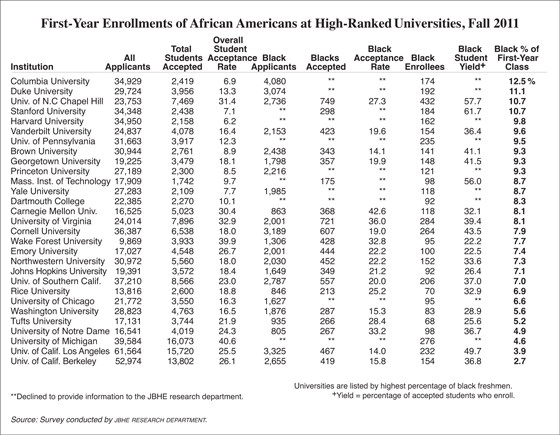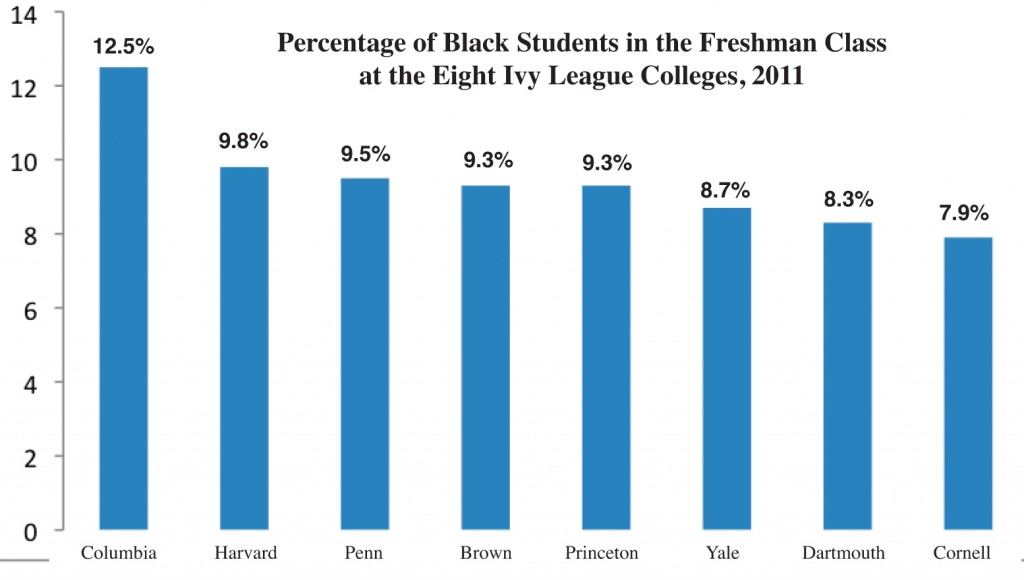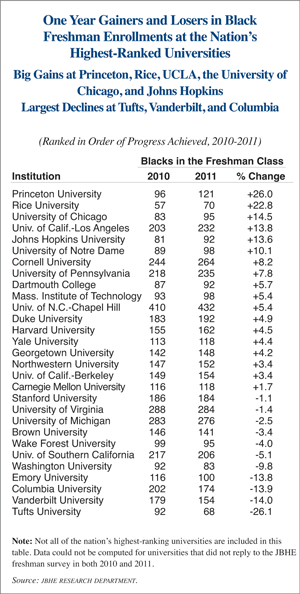Once more, this year The Journal of Blacks in Higher Education has completed its survey of admissions offices at the nation’s highest-ranked research universities. For the 19th consecutive year, we have calculated and compared the percentages of African-American students in this fall’s entering freshman classes. As in the past, our survey publishes information on the total number of African-American applicants at the various institutions, their acceptance rates, enrollment numbers, and yield rates (the percentage of students who eventually enroll in the colleges at which they were accepted).

Four years ago Columbia University headed the JBHE rankings for the first time. Now, for the fifth year in a row, Columbia has the highest percentage of Black freshman students among the 30 highest-ranking universities in the nation. There are 174 Black freshmen at Columbia this fall. They make up 12.5 percent of the incoming class.
In 2010, there were 202 Black first-year students at Columbia. They made up 14.5 percent of the incoming students. This was the highest percentage of Black students in the entering class at a leading research university in the history of the JBHE survey. Only seven years ago in 2004, Blacks made up only 6.8 percent of the entering students.
Duke University finished second in this year’s ranking, up from fourth place a year ago. There are 192 Black freshmen at Duke this fall. They make up 11.1 percent of the entering class.
The University of North Carolina at Chapel Hill has led our survey six times. Last year the university dropped to fifth place. In 2011, there are 432 Black freshmen at Chapel Hill making up 10.7 percent of the first-year class. This places the university in third place.
In a tie for third with UNC is Stanford University. The 184 Black first-year students make up 10.7 percent of the entering class. Stanford ranked third a year ago with an entering class that was 11.1 percent Black.
All of the other top research universities in our survey have entering classes that are less than 10 percent Black.
Harvard University ranks in fifth place with an entering class that is 9.9 percent Black. Vanderbilt, the University of Pennsylvania, Brown, Georgetown, and Princeton round out the top 10. Each has an entering class that is more than 9 percent Black.

The bottom three places in our survey belong to the University of Michigan, UCLA, and the University of California at Berkeley. All three universities are prohibited by state law from considering race in their admissions decisions.
For the 29 high-ranking universities for which we have data for both this year and last, 18 universities showed gains over last year in Black student first-year enrollments. Eleven high-ranking universities had declines in their number of entering freshmen who are Black.

The biggest percentage gain was at Princeton University. There are 121 Black freshmen at Princeton this year, up from 96 a year ago. This is a gain of 26 percent. Rice University posted a gain of 22.8 percent. The University of Chicago, UCLA, Johns Hopkins, and Notre Dame all had gains of at least 10 percent.
The largest decline was at Tufts University. There, the number of Black first-year students dropped from 92 in 2010 to 68 this year. Emory, Columbia, and Vanderbilt all had one-year declines of more than 10 percent in the number of Black students.
It is well recognized that the percentage of Black applicants who actually receive invitations to join the freshman class is a valuable gauge of an institution’s commitment to racial diversity. Yet this figure is regarded as the most sensitive of all admissions data. This is particularly true for some of the very highest ranked institutions.
Of the 29 highest-ranked universities that responded to our survey, 11 declined to reveal their Black acceptance rates. Unquestionably, public and private litigation threats to affirmative action policies in college admissions have been a factor in producing this sensitivity. With this in mind, admissions officers — who on the whole are solidly supportive of affirmative action — have apprehensions when statistics on Black admissions are made available to the public. There are standard concerns too that racial conservatives on faculties and among alumni and trustees may interpret the figures as suggesting a so-called dumbing down of academic standards and a favoring of “unqualified” Blacks over perhaps more qualified Whites.
But, at the same time it is critical to keep in mind that an institution’s high Black acceptance rate often indicates nothing more than the fact that the admissions office of a given institution has a very strong and well-qualified Black applicant pool.
At 11 of the 18 universities that supplied acceptance rate data to JBHE, the Black student acceptance rate was higher than the acceptance rate for all students. In some cases the differences were substantial. Seven of the high-ranking universities we surveyed had Black acceptance rates that were in fact lower than the overall acceptance rate. At the University of California at Berkeley and the University of California at Los Angeles, both of which were prohibited from taking race into account during the 2011 admissions process, the Black acceptance rate was significantly below the rate for all accepted students.


I think the key to a successful college career is graduating on time and the great University of Virginia still leads the nation with the highest Black student graduation rate for both public and private institutions.
In this age of post racialism and no race preference in college admissions, what do these rankings mean?
Who says we live in a age of post-racialism?